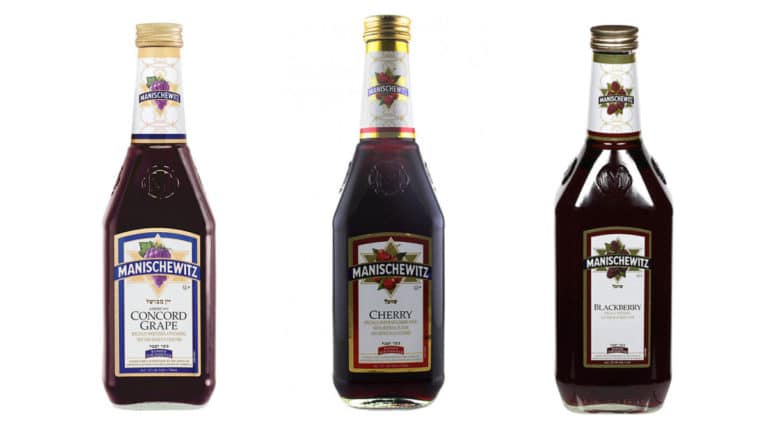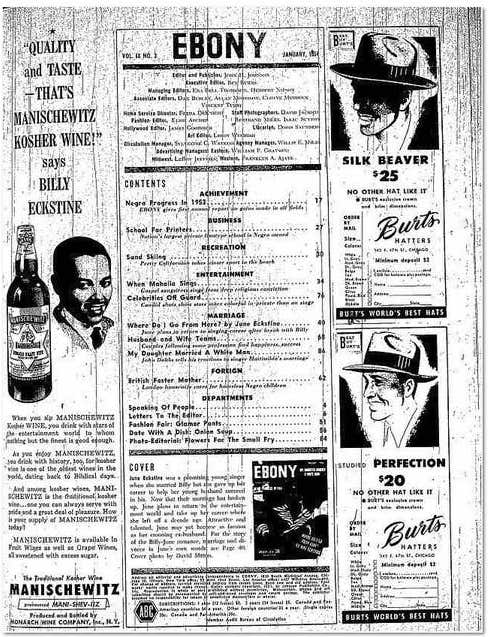
Most people associate Passover with the iconic bottle of Manischewitz. Or maybe it’s more like four iconic bottles — I mean cups — of that sweet, syrupy red wine. This Passover, we are uncovering 5 new facts about Manischewitz wine that you may not have known.
Why is it so sweet?
In the 1940s, when Manischewitz got into the business of wine-making, they chose to source labrusca grapes, typically known for their sour taste, from upstate New York. This was seemingly out of pure convenience — the vineyard was close enough that the grapes could be picked and shipped to Brooklyn to be crushed and fermented under kosher rabbinical supervision. Yet, due to the limited grape varieties that could grow in upstate New York, the conditions of the already-sour labrusca grapes was less than ideal. Certain batches of the wine turned out bitter and unpalatable, which inspired the company to add one ingredient that would ultimately define its entire brand: sugar. Manischewitz added loads of sugar to create a sweet flavor that imitated Concord grape juice.
Still today, it is this small addition that forever sealed the Manischewitz wine reputation: sweet, syrupy, red wine. We still can’t pinpoint just how much sugar is packed into a bottle, but maybe that’s for the best, though.
It’s still a staple, and not just for Jews.
To this day, Manischewitz reins supreme. Whether you love it or hate it, the wine is undoubtedly a popular item, and not just among Jews who grew up drinking it at seders or using it for kiddush at Shabbat. Everyone had that broke, non-Jewish college friend who always brought Manischewitz to the party. Right? It’s sweet and cheap, the quintessential college combination.
As it happens, in 2016 the Wall Street Journal found that of the almost one million cases of wine Manischewitz produces per year, 200,000 are exported to top markets in Latin America, the Caribbean and South Korea.
In 2017, USA Today reported that Manischewitz is a staple in many American-Caribbean communities. “It’s the immigrant’s fine wine,” said Carla Hill. Her mom, who is originally from Trinidad, is a “Manischewitz aficionado,” she told USA Today. Hill’s mom, Hazel Bethel, said she puts Manischewitz in everything. “Get some black cherry ice cream and some Manischewitz. It’s the bomb,” she said in the story. She even spikes her coffee with it, and Manischewitz is, of course, her go-to wine, not just for Christmas but in general.

It’s also a hit among some Asian communities. Shun Fat Supermarket in the San Gabriel Valley near Los Angeles sells hundreds of bottles of it each year to Chinese and Vietnamese customers, reported the Wall Street Journal.
Non-Jews have been Manischewitz fans since its founding
Turns out, this trend has been around for decades. In 1954, Commentary Magazine noted that although kosher wine is predominantly known as a sacramental Jewish wine, sales records that year indicated non-Jews love it too. “Sales graphs show peaks at Christmas and Thanksgiving several times higher than for Passover,” the article says. “Even such a relatively minor occasion as St. Patrick’s Day causes a discernible rise.”

Manischewitz has a hidden history beyond its ties to the Jewish tradition, explained historian Roger Horowitz in his book, Kosher USA: How Coke Became Kosher and Other Tales of Modern Food. Horowitz discusses how Manischewitz became a staple at the Jewish dining table and a sensation among non-Jews, too.
He writes that the makers of Manischewitz were ‘actively wooing’ non-Jewish consumers – and specifically targeting African-Americans, according to an article in NPR. By the mid-1950s, around 80 percent of Manischewitz wine consumers weren’t Jewish, writes Horowitz. Apparently, in 1981 Forbes magazine described the typical Manischewitz drinker as an urban, blue-collar African-American man, according to Horowitz.
In the 1950s, a doo wop band known as The Crows released a single called the “Mambo Shevitz” which spotlightted the Manischewitz promotional catchphrase, “Man, oh Manischewitz.”
Manischewitz also featured Black musicians in their advertising campaigns. In 1950, a band called the Ink Spots were featured in a print ad in the Pittsburgh-Courier newspaper, said Horowitz. “Manischewitz kosher wine harmonizes with us — sweetly!” was the tagline.”It’s our favorite wine, too.”
Iconic singer, Sammy Davis Jr. was the next to endorse Manischewitz. In a 1960 commercial he sang about the wonders of Manischewitz. This helped turn the “Man, Oh Manischewitz” slogan into a household name.
Manischewitz reached beyond planet earth, all the way to space!
Indeed, the Sammy Davis Jr. commercial was so popular that Apollo 17 astronaut Gene Cernan quoted it in space! He was recorded during his spacewalk saying “Manischewitz, look at that go! Did you see that?”
It was also reported that during the Apollo mission Cernan regularly used “Manischewitz” as a substitute for swearing.
Not all Manischewitz is Kosher for Passover
A fact that many Jews will already know. It’s true that historically, Manischewitz sweetened their wine with sugar. At some point, they switched over to corn syrup, though. Since corn-syrup, derived from corn, is a no-go for Ashkenazi Jews, the regular wine is not Kosher for Passover. Due to this, Manischewitz produces a special Kosher for Passover bottle, which uses cane sugar instead of corn syrup for sweetening.
Manischewitz: Do you love it or hate it? Let us know on Twitter and Instagram @JewishUnpacked


